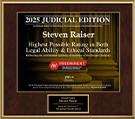
New York Drug DWI Attorney
Understanding Drugged Driving Intoxication Laws in New York
Driving under the influence of drugs (DWID) is a serious offense with significant legal implications in New York. New York State law prohibits operating a vehicle while impaired by the influence of drugs, including prescription medications, marijuana, and other controlled substances. DWID charges can carry severe penalties, ranging from hefty fines and probation to suspension of driving privileges and incarceration.
Statistics from local law enforcement agencies indicate a rising trend in DWID incidents across Nassau County, accentuating the need for knowledgeable legal representation. Being informed about these local trends helps in tailoring an effective defense strategy that considers the specific dynamics of New York's legal climate. At Raiser and Kenniff, P.C., our team of former prosecutors leverages their deep understanding of local and state regulations to provide rigorous representation in DWID cases.
To further complicate the challenge, the chemical tests used to establish drug use are not always straightforward. Unlike alcohol, where a breathalyzer provides immediate results, drug tests require blood samples, which can sometimes delay the legal process. Understanding these nuances is crucial, as Raiser and Kenniff, P.C. ensures every step is scrutinized, from the arrest protocols to how the evidence was collected and handled.
Call a seasoned New York drug DWI attorney today for a free consultation. We’ll help you understand your options and fight for your future—Call (888) 646-0025 now or contact us online to get started.
Understanding Drug DWI Laws in New York
Unlike alcohol-related DWIs, drug DWI cases in New York involve unique challenges related to detection, testing, and interpretation of evidence. Under New York Vehicle and Traffic Law § 1192(4), it is unlawful for any person to operate a motor vehicle while impaired by the use of a drug.
Drugs, in this context, include:
- Illegal substances such as cocaine, heroin, or methamphetamine
- Prescription medications like Xanax, Oxycodone, or Ambien (even when lawfully prescribed)
- Over-the-counter drugs that can cause drowsiness or impair judgment
Importantly, prosecutors are not required to prove a specific level of impairment based on a numeric value (as they would for a blood alcohol content test). Instead, they must show that your ability to operate a vehicle was impaired "to any extent" by the drug.


Why We're the Right Choice
Attentive Service. Strategic Defense.
Raiser and Kenniff, P.C. is here to help you get the results you need with a team you can trust.
-
Personalized Legal StrategyWe don’t believe in one-size-fits-all solutions. Every case is handled with a custom legal approach tailored to your goals, your circumstances, and your future.
-
Risk-Free Consultation
We offer a risk-free evaluation of your case and are here to help you understand your legal options. We are available 24/7, day or night, to help you.
-
Top-Rated Team
Nationally recognized for results. Our attorneys have been ranked among the best in the U.S., Trusted for their strategy, skill, and relentless client advocacy
-
Former ProsecutorsOur founding partners are both former New York prosecutors who bring unique experience and insights to every case, especially when it comes to going to trial.

Strategic Defense Backed by Over 100 Years of Combined Experience
At Raiser and Kenniff, P.C., we bring over a century of combined legal experience to each DWID case, providing our clients in New York with a tactical advantage. Our firm’s team, comprising former prosecutors, utilizes their insider knowledge of prosecution strategies, turning potential obstacles into opportunities for defense. This unique perspective is invaluable in challenging evidence such as field sobriety tests and laboratory results, which are often pivotal in DWID cases.
Our commitment to personalized service ensures each client receives the attention their case deserves. By intentionally limiting the number of cases we accept, we can allocate more time and resources to build stronger defense strategies tailored specifically to our clients’ needs. This approach not only enhances the quality of representation but also often results in more favorable outcomes for our clients.
Our attorneys also keep abreast of evolving legal precedents and scientific advancements that could impact DWID cases. This dedication to continuous learning and adaptation means our clients benefit from defenses that are not only robust but also dynamic, adjusting to the latest developments in law and science. This strategic vigilance further underscores the competence and commitment of Raiser and Kenniff, P.C. in safeguarding our clients’ rights and interests.
Why Choose a Drug DWI Lawyer in New York?
Choosing local representation for a DWID charge is critical due to our firm’s familiarity with New York’s legal landscape and jurisdictional nuances. The laws and penalties associated with DWID offenses can vary significantly across different regions, making localized expertise an essential asset in these cases. Local knowledge of court procedures, local prosecutors, and judges’ tendencies often plays a critical role in crafting an effective defense.
Our New York practice is well-versed in navigating these complexities, with a proven track record of successfully defending clients in Nassau County. We offer consultations that are accessible around the clock, ensuring clients can rely on immediate legal guidance and reassurance at any time of need. Our availability increases our clients' confidence in our dedication to securing the best possible results in their legal matters.
Moreover, our understanding of New York-specific community dynamics, such as local public safety campaigns and their impact on police checkpoints and enforcement practices, allows us to give our clients an informed, nuanced perspective on their individual cases. This local insight ensures that our legal strategies are specially tailored, increasing the precision and effectiveness of our defense approaches.
A knowledgeable New York drug DWI attorney can help protect your rights and minimize the consequences. Schedule your free legal consultation now—call (888) 646-0025 or message us online for guidance you can trust.


a Reputation For excellence
Read Our Client Testimonials
-
They treated me wonderfully and helped me out of a bind. I feel that this firm really cares.- Michelle A.
Frequently Asked Questions About DWID in New York
What Constitutes a DWID Charge in New York?
In New York, a DWID charge applies when a person is found operating a vehicle while impaired by any drug—legal, prescribed, or otherwise. This includes over-the-counter medications that may affect cognitive function or coordination. Law enforcement must establish that the driver’s ability was impaired to the slightest degree, often using field sobriety tests or drug detection protocols. Experienced attorneys at Raiser and Kenniff, P.C. can scrutinize these procedures and challenge the conditions under which evidence was gathered, ensuring that clients' rights are upheld throughout the judicial process.
The burden of proof in DWID cases is complex, as the prosecution must link drug consumption directly with impaired driving ability. This often involves expert testimony and technical evidence analysis. Our attorneys are skilled at cross-examining such expert witnesses and discrediting the prosecution’s link between the consumption of the substance and the alleged impaired driving.







